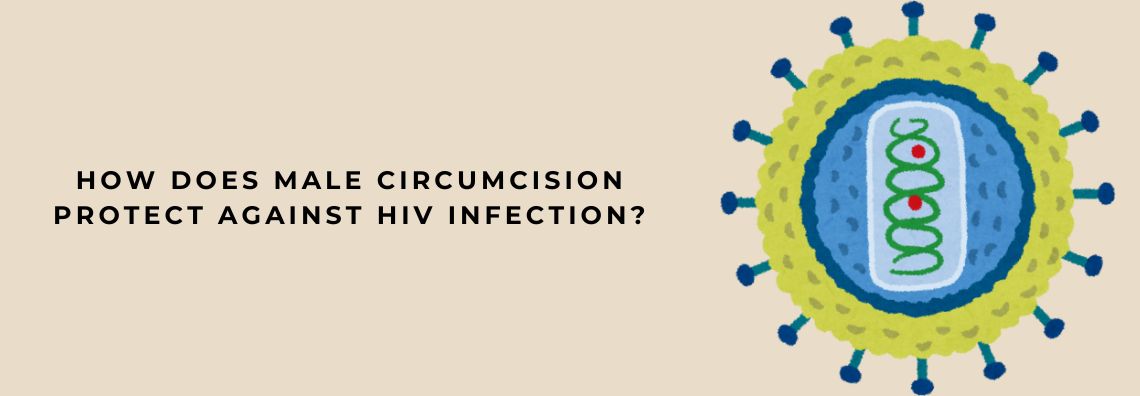
Some men might get circumcision done because of health benefits or to address certain medical conditions. It is believed that circumcision must be done after one week of birth to avoid further complications and risks which is why circumcision is often done on babies.
If someone is experiencing frequent urinary tract infections or infections of the foreskin then they can decide to get circumcion late in their life. Some medical considerations for getting circumcision include the prevention of penile and cervical cancer and, the prevention of sexually transmitted infections such as AIDS or HIV.
What Is Male Circumcision?
Male circumcision is a surgical procedure that involves removing the skin that covers the tip of the penis, called the foreskin. The treatment is often performed on newborns because later in life it may have more complications and recovery might be longer.
The procedure involves the surgical removal of a portion of the foreskin from the penis and it is typically performed using a medical device or scalpel. The medial expert will carefully separate the inner layer of the foreskin from the glans, followed by the excision of the excess skin. They might use a local anaesthetic to minimise the discomfort.
Key points about male circumcision:
- Circumcision specialists will perform the procedure. They will expose the glans by opening the foreskin. They will carefully separate the inner layer of the foreskin from the glans. This will be done before removing the required amount of tissue from the surgical instrument.
- For newborns, a topical anaesthetic will be used. For older children and adults local anaesthetic injection or general anaesthetic will be used depending on the condition.
- Dissolved stitches will be used in some cases, especially with older children or adults.
- The area will be cleaned and bandaged by the circumcision specialist. They will instruct you to monitor the signs of infections and to avoid heavy workouts or exercises for a particular period.
The overall procedure is safe and the recovery is better if the procedure is being performed on the newborns or younger children.
HIV Infection and Circumcision: Key Insights
Although male circumcision does not provide complete protection against HIV infection; it can lessen the chances of a man acquiring the virus. Circumcised males are 60% less likely to become infected with HIV. Circumcision can also protect against other sexually transmitted infections at some point including syphilis and gonorrhoea.
Circumcision might be performed to get hygiene benefits, but it is not the only solution to be protected from HIV. You must get complete information from the healthcare professional about HIV and circumcision. Here we will try to provide you with the important points to consider in HIV and circumcision:
- There is still ongoing research on HIV and circumcision. The impact of circumcision on HIV transmission still needs broader studies.
- Some studies show that male circumcision can reduce the risk of acquiring HIV. Some of the clinical trials have shown a reduced risk of HIV by 60% in uncircumcised men.
- The trials have shown more impact on heterosexual HIV transmission.
Circumcision removes the inner foreskin which has more cellular receptors for HIV. By getting circumcised you will reduce the inflammation in the penis which can be the result of sexually transmitted infections.
Factors Influencing Circumcision
Several factors influence the process. Men might get circumcised for several reasons involving cultural beliefs, medical considerations and personal beliefs. Understand here:
Personal Beliefs
Men choose to be circumcised because of some personal beliefs such as hygiene and appearance. Infections and unpleasant odours can be caused because of the trapped sweat, dead skin cells and bacteria in the foreskin. Some medical experts suggest getting circumcised to reduce the risk of urinary tract infections and the risk of HIV or AIDS.
Cultural Benefits
Cultural or religious beliefs often become a reason for circumcision in males. Circumcision is common among many religions and cultures, including Judaism, Islam and some indigenous cultures. It can be a family tradition and a cultural practice which is a rite of passage.
Medical Considerations
A person who is experiencing frequent urinary tract infections or infections of the foreskin gets circumcision done to reduce the risk of these issues. You will promote hygiene and health benefits if you decide to be circumcised.
The foreskin becomes too tight to be pulled back over the head of the penis or cause pain or difficulty during urination, called phimosis, which can be treated with circumcision. Some people prefer getting circumcision done because of hygiene concerns and other medical reasons.
It is up to the person why they are getting circumcision surgery done, whether it is cultural beliefs or personal hygiene beliefs.